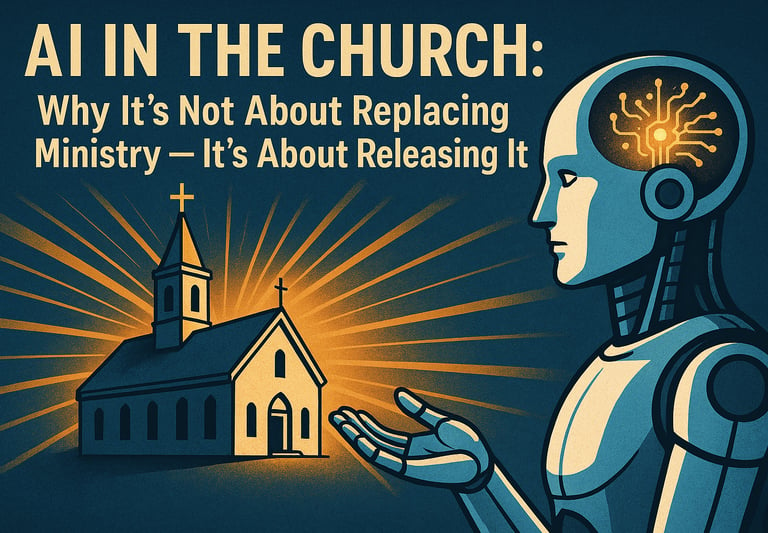AI in the Church: Why It’s Not About Replacing Ministry — It’s About Releasing It
Learn how pastors and small church staffs can use AI to save time, streamline tasks, and focus more on ministry. Practical, ethical tips for AI in the church.


Why AI in the Church Matters
If you’ve been in ministry for more than five minutes, you know the feeling:
The inbox is overflowing, Sunday is always coming, and the “urgent” keeps pushing the important further down the to-do list.
For pastors and small church staffs, the reality is clear — there’s never enough time in the week to do everything you wish you could. And too often, the work that gets pushed aside is the very thing you got into ministry for in the first place: connecting with people, discipling believers, and serving your community.
That’s where AI can quietly step in and help.
AI Is Not the Enemy — It’s the Assistant You’ve Been Waiting For
Artificial Intelligence often gets a bad rap in church circles — sometimes because it’s misunderstood, sometimes because it’s misused. But AI isn’t here to replace your calling. It’s here to help you fulfill it.
Think of it like the church secretary of the digital age — available 24/7, never calling in sick, and able to handle the repetitive, time-consuming tasks that keep you from your main work.
Writing: Draft newsletters, bulletins, and sermon discussion questions in minutes.
Organization: Manage volunteer schedules, plan events, and keep your church calendar up to date.
Creativity: Brainstorm outreach ideas, design flyers, and even create worship slides faster.
The goal? To take the “busy” out of busywork so you can get back to the ministry that matters most.
For Small Staffs, This Is a Game-Changer
Large churches often have entire teams for communications, media, and administration. Smaller congregations? Not so much. Many pastors are wearing every hat: preacher, counselor, tech director, custodian, and coffee-maker.
AI can help level the playing field — not by replacing people, but by giving overworked leaders the breathing room to focus on people instead of paperwork.
A Quick Aside: Wesley AI
If you’re part of a United Methodist congregation, there is an AI tool built specifically for your context. Wesley AI can sit quietly on your church website, ready to answer visitor questions about service times, ministries, and theology — all without pulling staff away from their ministry work. It’s one of many ways churches can put AI to work without losing their personal touch. Find out more!
AI in the Wesleyan Tradition
As Wesleyans, we’ve always embraced tools to spread the Gospel — from printing presses to hymnals, radio to livestreams. AI is simply the latest in that long tradition.
John Wesley said, “Do all the good you can, by all the means you can.” If AI can help us reach more people, disciple more effectively, and serve our communities better, it fits right in with that call.
Where to Start
If you’re new to AI, here are a few easy ways to dip your toes in:
Automate Weekly Email Drafts – Let AI help create announcements and prayer updates.
Plan Sermon Series Content – Brainstorm titles, outlines, and Scripture links.
Batch Create Social Media Posts – Write a month’s worth in one sitting.
Set Up a Simple Q&A Tool – Like Wesley AI, to handle common questions 24/7. Book a Demo
The Bottom Line
AI in the church isn’t about replacing ministry — it’s about releasing ministry. It’s about removing unnecessary bottlenecks so leaders can invest their best time, energy, and creativity into people, discipleship, and community impact.
In the weeks ahead on this blog, we’ll explore practical tools, ethical boundaries, and real-world stories of churches using AI to strengthen, not weaken, their mission.

